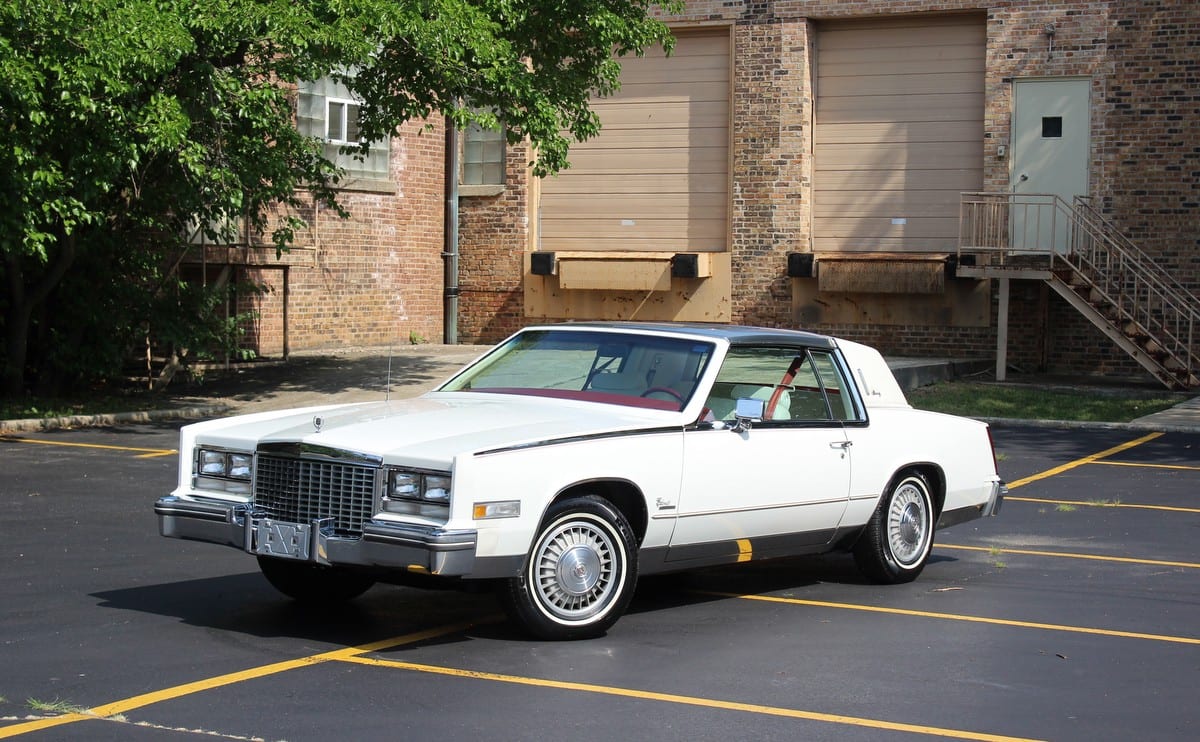A case involving the disposition of a 1979 Cadillac Eldorado, In re Estate of Theodore George, made its way to the Vermont Supreme Court, where the Court determined who rightfully owned the car after decedent’s death. Although it is common for people to question who owns a decedent’s car after death, it is rare for such a case to make it to the Vermont Supreme Court.
The Facts of In re Estate of Theodore George
Theodore George purchased a 1979 Cadillac Eldorado in 1992 (the “Cadillac”). The Vermont Department of Motor Vehicles (DMV) issued a Certificate of Title to Theodore in 1994. The Cadillac was titled in Theodore’s name only.
The DMV Form
In 2006, Theodore submitted to the DMV a Vermont Registration, Tax, and Title Application (2006 Registration Application) for the car. His name was listed in the space provided for the owner, and his daughter Deborah’s name was listed in the adjacent space provided for a co-owner. Next to Deborah’s name, a handwritten annotation said, “add co-owner.” The form directs applicants to select rights of survivorship if more than one owner is listed and provides that “if no box is checked joint tenants will be selected.” Theodore made no indication. At the bottom of the form, Theodore signed the application; the line for the co-owner’s signature was left blank. No bill of sale accompanied the 2006 Registration Application. The DMV issued registration certificates naming both Theodore and Deborah for several years.
The Vermont Probate Court – Decedent Owned Car At Death
In 2016, Theodore executed his will. The will devised the Cadillac to Christine George, one of Theodore’s other daughters. A 2017 codicil also devised the Cadillac to Christine.
Theodore died in November 2017 and the will and codicil were admitted to probate. The executor of the estate listed the Cadillac as an asset of the estate.
Deborah objected to the inclusion of the Cadillac as an estate asset.
The probate court did not find clear evidence of ownership. The court acknowledged the registration application, but noted that it was unclear who wrote the notation “add co-owner,” and that there was no accompanying bill of sale. The Vermont probate court also noted that the decedent attempted to dispose of the Cadillac under the later will and codicil, which suggested that he believed that he owned the car and was free to bequeath it after his death. The Vermont probate court found that the Cadillac was properly part of the estate.
Deborah appealed the decision to the Civil Division of the Windham Superior Court. The Court affirmed, determining that 23 V.S.A. §2023, which governs vehicle transfers, requires ownership to be transferred through assignment of the title certificate. The court determined that the 2006 Registration Application alone was insufficient to transfer an interest in the vehicle.
Deborah appealed to the Vermont Supreme Court.
How Can You Transfer An Interest In a Vehicle In Vermont?
Section 2023(a) of Title 23 governs the transfer of interest in a vehicle and provides:
If an owner transfers his or her interest in a vehicle…he or she shall, at the time of delivery of the vehicle, execute an assignment and warranty of title to the transferee in the space provided therefor on the certificate or as the Commissioner prescribes….
Deborah argued that this provision allows the DMV commissioner to prescribe alternate methods by which vehicle owners can transfer ownership. She asserted that the Commissioner has designated Form VD-119 as one such alternative. She pointed to language on the DMV website explaining that Form VD-119 can be used for “new transactions, transfers, renewals, title-only transactions, adding or deleting an owner, lease buyouts, and IRP transactions.”
The Vermont Supreme Court agreed that section 2023 allows alternate methods for transfer of vehicle ownership, and examined whether Form VD-119 was one such vehicle.
The court noted Form VD-119 lacks any language of intent to transfer – nor do the instructions associated with the form, which require a bill of sale be provided with the form to demonstrate new ownership.
Thus, Form VD-119 on its own does not purport to serve as a legal mechanism for the transfer of ownership, either on its face or pursuant to the DMV instructions. Instead, the form and its instructions explain that it is meant to serve as the next step after transfer, rather than an alternative to transfer.
Deborah also asserted that she owned the car after her father’s death because section 2023 cannot be used to transfer ownership of a car over fifteen years old.
The Vermont Supreme Court disagreed, stating:
As an initial matter, we disagree with daughter’s argument that 23 V.S.A. §2023 cannot be used to transfer ownership when a vehicle is more than fifteen years old and thus exempt from receiving a new title under 23 V.S.A. §2012. Transfer under §2023 does not hinge on the issuance of a new title; instead, it requires assignment of the current title. The exemptions listed in §2012 did not prevent decedent from assigning his interest on his current title.
The Vermont Supreme Court concluded that decedent’s 2006 Registration Application did not transfer an interest in the vehicle to Deborah.
When Is a Car Considered an Inter Vivos Gift?
A car can be given as an inter vivos gift (a gift during the lifetime of the parties). Indeed, section 2023 provides that compliance with the statute is necessary to make a transfer “except…as between the parties”.
The Vermont Supreme Court concluded that despite Theodore’s noncompliance with 23 V.S.A. §2023, the Cadillac may be excluded from the estate if there was clear and convincing evidence of a valid gift between Theodore and Deborah.
The Court stated:
To the extent that the probate division considered this issue, it conflated decedent’s testamentary intent in 2016 with his donative intent in 2006 and improperly focused on his testamentary wishes as expressed in his will and subsequent codicil. This was error because, if decedent made an effective gift to daughter in 2006, his remaining interest in the vehicle passed to daughter upon his death, and decedent’s will and first codicil could not have disposed of property that he did not own at death.
The Court considered whether sufficient evidence was presented for the civil division to have found that the decedent completed an inter vivos gift of an interest in the vehicle to the daughter in 2006, making her the owner of the car after decedent’s death.
What Are the Requirements For an Inter Vivos Gift Under Vermont Law?
An inter vivos gift requires two essential elements: donative intent and delivery.
As to donative intent, the Vermont Supreme Court stated:
The record here contains some evidence of decedent’s donative intent. Decedent submitted the 2006 Registration Application to the DMV, which named daughter as co-owner of the vehicle and included the notation “add co-owner.” Decedent signed the application. This act tends to show that decedent intended to transfer an interest to daughter…Further, the DMV issued multiple registration certificates for the vehicle which named both decedent and daughter, and there is no evidence that decedent ever objected to these certificates. Even if this evidence is sufficient to establish donative intent, however, daughter has failed to satisfy the element of delivery.
Delivery requires “complete possession and control” of the property to complete an inter vivos gift. Deborah argued that delivery is immaterial here because decedent sought to convey only a partial interest in the vehicle to her. The Virginia Supreme Court disagreed:
We need not decide what level of possession or control is necessary to complete a gift of joint ownership of tangible property, however, because the record here does not show that daughter exerted any possession or control over the vehicle at all.
In sum, decedent failed to transfer an interest in the Cadillac to Deborah under 23 V.S.A. §2023, and Deborah failed to prove by clear and convincing evidence that decedent gave her an interest in the Cadillac as an inter vivos gift. Accordingly, decedent was the sole owner of the vehicle at the time of his death, and the vehicle was properly included in his estate’s inventory after his death.








